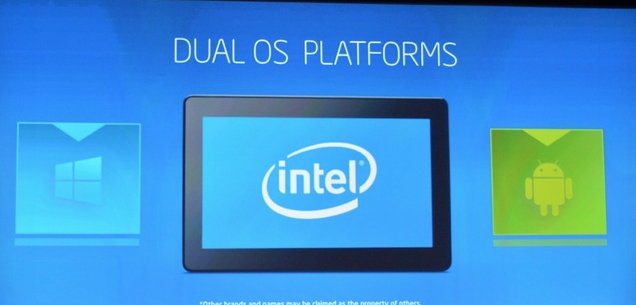 After the news earlier today that ASUS had introduced a dual-OS device in the Transformer line, Intel referred in its CES 2014 press conference to throwing its support behind the Dual OS functionality. Intel confirmed that its processors would power computers that can switch between Windows and Android at the touch of a button, demonstrating the technology in a proof of concept during their presentation.
After the news earlier today that ASUS had introduced a dual-OS device in the Transformer line, Intel referred in its CES 2014 press conference to throwing its support behind the Dual OS functionality. Intel confirmed that its processors would power computers that can switch between Windows and Android at the touch of a button, demonstrating the technology in a proof of concept during their presentation.
Intel also discussed other things in its presentation that were of some Android interest, including an Intel Device Protection Technology which supposedly will smooth the integration of Android into enterprise security environments, though there wasn’t a lot of detail on how this will translate to real world use.
Intel isn’t alone in pursuing the Dual OS philosophy; AMD has announced a partnership with BlueStacks (makers of Android emulation layers for PCs) to run full-screen and windowed Android apps alongside Windows itself, instead of a dual-booting / switching setup. AMD plans to do this with a built-in ARM processor core inside new AMD processors, allowing them to run Android code natively even though its compiled for a different architecture.
What are your thoughts on switching between Windows and Android in the manner ASUS and Intel have been talking about today? Will it drive the adoption of Android even further? Will it help seal the demise of Windows as a desktop OS? We think that’s taking it a bit far, but we’re certainly interested to see where this goes.




I agree with the author that it’s highly unlikely to negatively impact Windows desktop OS; I think in fact it’ll be a good thing for Windows 8 and it’s App store.
But I think it could be disastrous for Windows Phone, perhaps even a nail in the coffin.
It could also hurt Android tablet app ecosystem. If people switch to the real app when they do ‘big screen things’ three will be less push to make decent big screen Android apps.
Just finished Ars Technica’s retrospective on OS/2 and how windows compatibility probably prevented any one writing any software for OS/2 itself.
Should add. The player it really helps is Intel.